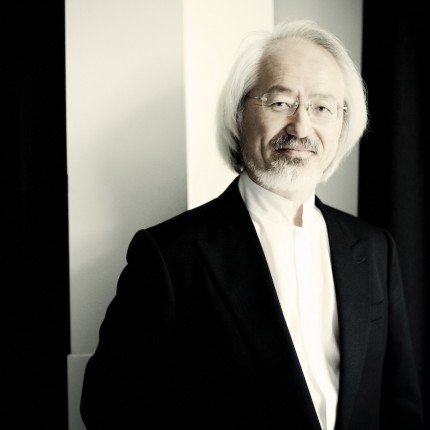Acclaimed Bach Collegium Japan to perform Mass in B minor at Valpo

For a while, it looked like the American tour for Bach Collegium Japan was not going to happen at all in the wake of the catastrophic earthquake and tsunami that engulfed the nation last week.
Fortunately, music director Masaaki Suzuki and his colleagues were able to depart Tokyo on time just two days after the tragedy struck, and land at O’Hare on Monday.
“We’ve never experienced this much disaster.” said Suzuki from Grand Rapids, the first stop on the tour. “The families of our ensemble members were fine for the moment, so we were very grateful for that. The [Tokyo] airport and transportation were not much damaged. The flights have been reduced and it’s more difficult to fly out now, so we were very lucky.”
The Japanese conductor will lead his celebrated ensemble Saturday night in a performance of Bach’s Mass in B minor at Valparaiso University. This Indiana performance—about a 90-minute drive from downtown Chicago—is the only midwestern date on the tour, which will take them to Carnegie Hall next week.
Suzuki founded Bach Collegium Japan in 1990. Even with the international makeup of the classical music world, there was initial skepticism at a Japanese conductor, singers and instrumentalists performing the uber-German choral works of Johann Sebastian Bach.
Yet following rave reviews in Gramophone and elsewhere, Suzuki’s recordings quickly earned acclaim and a dedicated international following, feted for their scrupulous research, informed and stylish playing on period instruments and wholly idiomatic German and Latin.
“Bach’s music was very well known in Japan and most orchestra members have trained in Europe,” said Suzuki of the group’s early years. “So it was not that difficult to find good players. The hardest thing was to get musicians who are not only technically good but who also can get along without any problem.”
Yet while there were plenty of superb Japanese singers trained in Europe, Suzuki said it was more of a challenge in the ensemble’s early years to find singers with a firm grasp of Bach style. “At that time it was difficult to find singers because they’re more aiming to be opera singers. Now, they’re getting better and better and young singers are more aware [of nonopera styles].”
Most difficult was assembling the choir. “Bach’s music was very known but not really as much in the professional area. There are very few professional choirs because this kind of choir tradition just doesn’t exist in Japan.” Suzuki says his current lineup of 12-16 singers is the most secure and seasoned he’s ever had. “Now the choir has been quite stable for the last five or six years and I’m very happy with the quality.”
Saturday’s event is being presented by Valparaiso’s Bach Institute, which was founded in 2004.
Director Christopher Cock, a respected Bach tenor in his own right, says that the institute reflects Valparaiso’s history as a university with a strong Lutheran tradition.
“Valpo has always had a distinct German Lutheran connection,” said Cock. “Our primary mission is to study the life and works of J.S. Bach from their musical and theological perspective. We do the major works on a triennial basis. If you’re going to perform the works of Bach, one should understand something about the worship context in which they were presented in Bach’s day.”
The Bach Institute presents performances by school forces and outside ensembles of Bach’s works, along with various workshops and seminars every semester. “With the Bach Institute and our mission, we really felt that presenting Maestro Suzuki and the Bach Collegium was a natural fit.”
Bach’s epic Mass in B minor holds a special place in Suzuki’s heart. “The B-minor Mass was my first big vocal work of Bach. I had a copy of the score when I was a schoolboy, and at that time the Karl Richter recording was the only one available.”
“The Mass is special because there are a lot of quotes from other works, and he has taken so much of what he composed in his middle twenties. What I find most fascinating is the polyphonic technique in the Credo and other sections, which is amazing.”
Now in its 21st season, Suzuki and the Bach Collegium Japan have released forty volumes of Bach’s sacred cantatas on the Bis label, and will complete the entire project in 2013.
“That makes me a little sad because I really don’t want to finish it,” Suzuki said with a laugh. The group will go on to record the rest of Bach’s vocal works with a St. Matthew Passion and the secular cantatas on tap following their completion of the sacred cantatas.
“Bach is the central being in my life but I do conduct a lot of other composers as well,” adds the Japanese conductor. “Though I find after I conduct Mozart or Mendelssohn or even Mahler, I always feel like I’m coming back to my home with Bach.”
Masaaki Suzuki and Bach Collegium Japan will perform Bach’s Mass in B minor 7:30 p.m. Saturday night at Valparaiso University. http://www.valpo.edu/bachcollegiumjapan/index.php; 219-464-5162.
Posted in Articles

